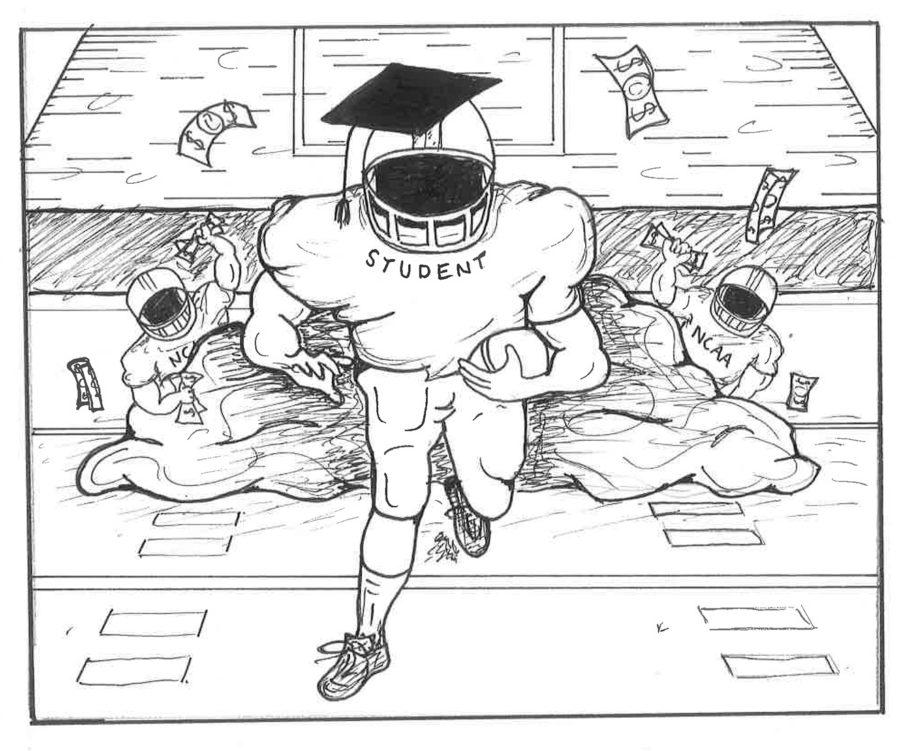Brown: Colleges should be able to pay athletes
Illustration: Michael Caley/IowaStateDaily
Pay for play
February 14, 2014
The universities of our nation are wonderful places. They embody intellectual achievement, societal advancement and increased economic opportunity for their students. However, there is another public service for which our colleges are known, in some cases better than academics: athletics. Yes, our hallowed academic institutions also serve as focal points for fans of all sports to cheer for their school and their team.
Speaking with any athletics administrator, coach or NCAA official, it is clear, though, that such sporting events are merely sideshows to the educational function of a university. The unofficial motto of college sports, “student-athletes are students first” has been repeated so many times that those doing the repeating might actually have started believing themselves.
Even so, there remain those of us who realize how nonsensical the statement really is.
Before going any further, let me make myself clear. The vast majority of college athletes are college students first and foremost who happen to enjoy membership on a sports team. Very, very few of the athletes at a university are there merely for their playing abilities.
With that said, the fact remains that there do exist students who have been systematically recruited solely for their athletic prowess. We can all keep saying that every student athlete is a student first until our faces turn blue, but that does not make it true. No matter what rules the NCAA puts in place and no matter what expectations or standards a college sets, a small number of students are recruited purely for their ability to play a sport.
Pretending these cases do not exist or drawing attention to their limited number does nothing to remove the reality that universities across the country are enrolling specific individuals only because they can bring the school success or revenue by competing in athletic contests.
Having made this clear, it is absurd to disallow these professional athletes — and they should be considered professional athletes — from being compensated in certain ways. Yes, student-athletes can be given scholarships. They can be given money for room and board, free apparel, free travel, access to a world-class training facility and many other scholarly benefits, but heaven forbid they be paid with currency not intended for necessities.
The fact that some student-athletes are given an array of benefits other students may not enjoy is no reason to deny them additional payment for their impressive talents. Who deserves what from a university is for the university alone to decide.
Likewise, the fact that student-athletes are given an education is no reason to deny them certain compensations. A college education is of high value to many people and statistically speaking increases earning potential, but to some it may not be as valuable as even a small amount of cash in-hand. That judgement call is certainly not for the NCAA or anyone else to make on behalf of all student-athletes.
Of course, there are more to college athletics than economic factors. Academic institutions may rightly worry that their good names could be stained by the act of hiring professionals to compete in athletic contests designed to match students with students. The very notion that a university would enroll a student for purposes other than academics might bother some. This loss of integrity is simply not a valid argument against a pay for play scheme, though, since it is already occurring in the absence of such a system.
It should be noted that the NCAA, effectively the “league” of collegiate sports, does have an interest in retaining what parity exists. Allowing colleges to pay untold amounts of money to their athletes would disproportionately benefit wealthy schools at the expense of smaller institutions. Luckily, professional sports have already found a way to combat this: create a salary cap for individual sports. This simple solution would allow certain high-value players to be rightfully compensated for their performance while keeping the playing field relatively even.
Even with all of this, the argument can still be made that college sports are fundamentally different from professional sports, and they are. Collegiate athletics are contests between students, and they should remain that way. Each player should have to actually be a student and remain in good academic standing. Giving certain athletes payment for their skills does not magically make them no longer students; it makes them students with a fair-paying job.
When proposing drastic alterations to any status quo, it often falls on those seeking change to show why their system should be adopted. In the case of paying college athletes, however, the more appropriate question to ask is why our universities are being made to abide by a senseless ban on certain compensations for their professional student-athletes.







